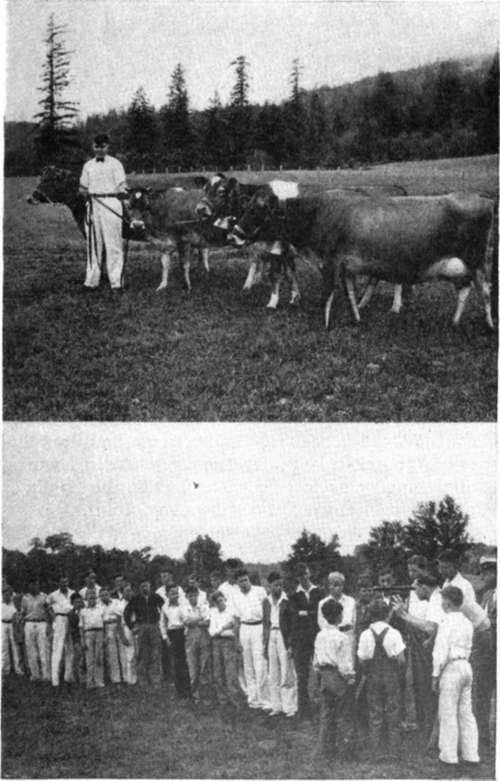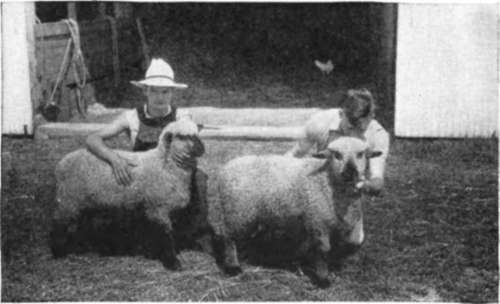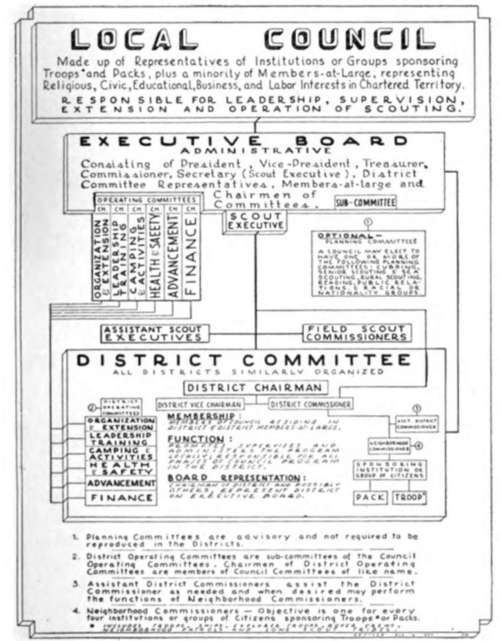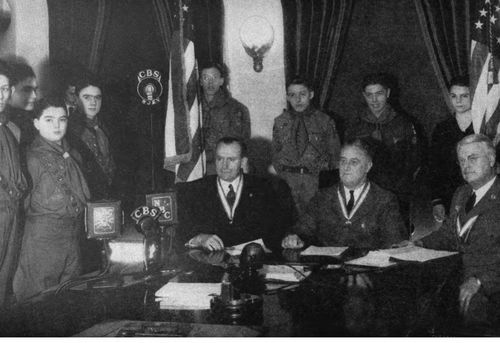Chapter VI. The National Council Plan For Rural Scouting
Description
This section is from the book "Scouting For Rural Boys. A Manual For Leaders", by Boy scouts of America. See also: Outdoor Adventure Manual: Essential Scouting Skills for the Great Outdoors.
Chapter VI. The National Council Plan For Rural Scouting
The main motive behind Rural Scouting efforts is to bring Scouting opportunities to the boys of the small rural places and the open country.
This involves two duties:
1. The servicing and helping of existing units in their efforts to do a better job.
2. The extension of Scouting privileges to rural boys not now reached.
In its fundamental essence, this is the "National Plan for Rural Scouting" and the responsibility for following through on it and getting it done and well done rests upon the Local Council and its District Organization.
What are the essential steps which the Local Councils should take to serve their rural boys?
1. Analyze the Council Area.
Of what kind of territory does it consist? Cities, towns, villages, open country?
2. List what is now being done.
Perhaps "spot" it on a large scale map. What Troops, Packs, Ships, Crews, Tribes, Neighborhood Patrols, Lone Cubs, Lone Scouts, Lone Explorers and Lone Rovers are now being served in the Council Area?
3. List Institutions not now Using the Program.
A survey of the institutions, organizations, agencies and places where Scouting groups may be established. This creates a list of "next jobs to be done."
4. Check the Council Organization.
The Local Council should check its "set-up" for three things: a) Are the necessary parts (committees and officers) all in the "set-up"?
b) Is the District fully organized and "service conscious," and with representatives of the important rural interests active in it?
c) Is there any "dead wood" which should be replaced to get "action"?
5. Formulate a Plan of Action - Council Through District Organization.
This, of course, should be done democratically so that those concerned have a voice in the planning. This method holds good in the Patrol, Tribe, Troop, Committee, District, and the Council. In Rural Scouting, the District operates directly with and for the institution and community. This plan of action will include service, extension, training, activities, financing, public relations and the whole sweep of program implications.
6. Division of Labor.
The plan of action must be divided up into "doable" units which shall be accepted by the individuals or committees who are going to carry out the plan.
7. Periodic Checking and Reporting.
To check on a job to be done, while there is yet time to get it done, is good management. To wait until no one else could do a job, before knowing if it has been started-or not-jeopardizes the whole thing, so the monthly check-up constitutes a sort of insurance policy for attaining goals.

COUNTRY BOYS LEARN DAIRYING AND SURVEYING.

FOUR-H CLUB OXFORD DOWN RAMS-OHIO.
By the word "checking" is meant no "military inspection" check-up-rather the word implies warm, cordial inquiry as to "How far?" with the spirit of "Can I help in any way?" being ever present.
8. Recognition.
The Council and its employed executives and its officers need to be liberal and generous in extending recognition and appreciation to the volunteers who do the work. Voluntary effort hinges heavily on morale -and morale is fed by recognition. Scouting is a team-work job, with no place for the "spotlight hog."
These, then, are the major items of approach and action and the fuller details of how to do them should be viewed in two separate chapters-one, from the angle of the Council; the other, the all-important District, where the work of the Council is done.

SCOUT LOCAL COUNCIL AND DISTRICT COMMITTEE ORGANIZATION.

Continue to:


